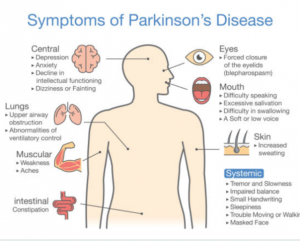Parkinson’s disease is all about an illness that affects the part of your brain that controls how you move your body. It’ll come so gradually that you’ll not even notice it at first. But over time, what starts as a little shakiness in your hand can have an impact on how you walk, talk, sleep, and think. You’re more likely to get it when you’re 60 or older. It’s also possible for it to start when you’re younger, but that doesn’t happen early as often. There’s no cure for Parkinson’s disease, but the person can get treatment and support to help manage the symptoms.
No specific test exists to diagnose Parkinson’s disease. Your doctor trained in nervous system conditions (neurologist) will diagnose Parkinson’s disease based on your medical history, a review of your signs and symptoms, and a neurological and physical examination. Your doctor may suggest a specific single-photon emission computerized tomography SPECT scan called a dopamine transporter (DAT) scan. Although this can help support the suspicion that you have Parkinson’s disease, it is your symptoms and neurologic examination that ultimately determine the correct diagnosis. Most people do not require a DAT scan. In addition to your examination, your doctor may give you carbidopa-levodopa (Rytary, Sinemet, others), a Parkinson’s disease medication. You must be given a sufficient dose to show the benefit, as low doses for a day or two aren’t reliable. Significant improvement with this medication will often confirm your diagnosis of Parkinson’s disease. Sometimes it takes time to diagnose Parkinson’s disease. Doctors may recommend regular follow-up appointments with neurologists trained in movement disorders to evaluate your condition and symptoms over time and diagnose Parkinson’s disease.
This disease is a progressive nervous system disorder that affects the movement of the body. It includes stiffness or slowing of movements which then relates to the muscular system of the body. Because of the effects created by this disease like tremors, rigid muscles, slow movement, walking and balancing problems, it happens because the nervous system is affected which leads to these effects. Deep down in your brain, there’s an area called the substantia nigra. Some of its cells make dopamine, a chemical that carries messages around your brain. When you need to scratch an itch or kick a ball, dopamine quickly carries a message to the nerve cell that controls that movement. When that system is working well, your body moves smoothly and evenly. But when you have Parkinson’s, the cells of your substantia nigra start to die. There’s no replacing them, so your dopamine levels drop and you can’t fire off as many messages to control your body. Early on, you won’t notice anything different. But as more and more cells die, you reach a tipping point where you start to have symptoms.
Concluding that because of this disease, there is a progressive disorder in the nervous system which then leads to a disorder in another system called ‘muscular system’.
Parkinson’s disease can’t be cured, but medications can help control your symptoms, often dramatically. In some later cases, surgery may be advised. Your doctor may also recommend lifestyle changes, especially ongoing aerobic exercise. In some cases, physical therapy that focuses on balance and stretching also is important. A speech-language pathologist may help improve your speech problems. There are some medications to it such as:-
- Carbidopa-levodopa
- Carbidopa-levodopa infusion
- Dopamine agonists
- MAO B inhibitors
- Catechol O-methyltransferase (COMT) inhibitors
- Anticholinergics
- Amantadine
Choosing the factors ethical, social, and economical:-
- Ethically the scientific advances used to cure the disease are treatments. They are clinically proven by a foundation called ‘Mayo Foundation for Medical Education and Research (MFMER)’.
- Socially these advances do not harm the surrounding or the society near the person. Below the age of 40 – 50 it is a rare disease however it is found more common above the age of 60 years.
- Economically these treatments do cost some money however this being a common disease at the age above 60 years, the expenses are lowering down. The costing of these treatments does vary from country to country.
